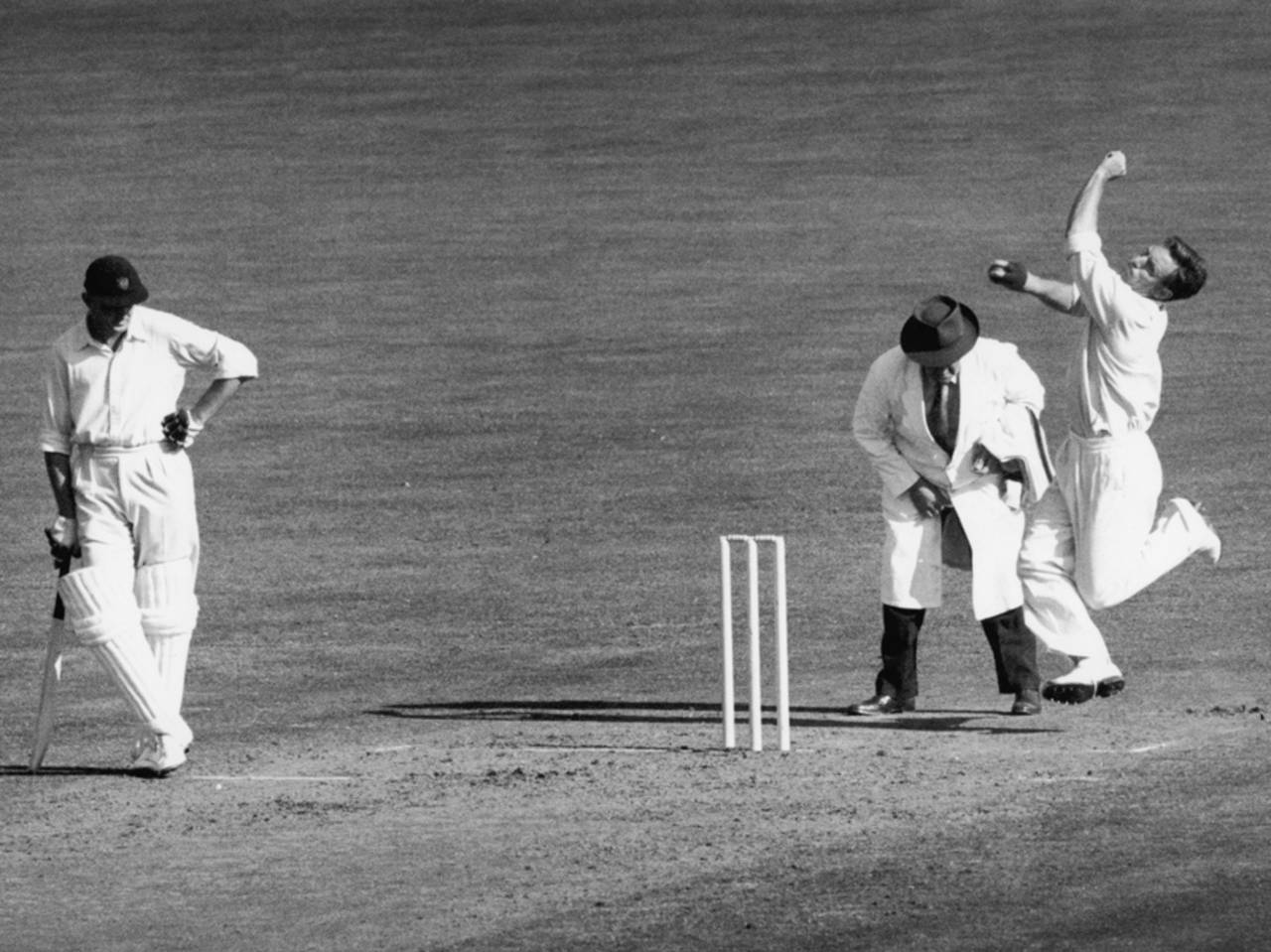King of swing
The archetypal fast bowler

Ray Lindwall took 228 wickets in 61 Tests • Hulton Archive
One of the greatest fast bowlers of all was born on this day. Ray Lindwall was a brilliant swing bowler and a shoo-in for any all-time-great Australian XI. As a child he would play in the street along which Bill O'Reilly walked home, in the hope of catching the great man's eye. He certainly managed that. But Lindwall was more than just a top-class bowler: the Wisden Almanack described him as "perhaps the man who established fast bowling's role in the modern game". The leader of the Invincibles attack in 1948, he enjoyed a sodden pitch in the last Test at The Oval - his 6 for 20 hurried England out for 52, still their lowest total in Ashes Tests in England. Remarkably, 43% of Lindwall's 228 Test victims were out bowled. He died in Queensland in 1996.
Birth of the tragic Johnny Briggs, a brilliant, penetrative slow left-armer. His 118 Test scalps came at the Waqar-esque strike rate of a wicket every 45.19 balls, and his 21 wickets against South Africa cost just 4.81 runs each. In Cape Town in 1888-89 he returned match figures of 33.3-16-28-15 (14 of the 15 were bowled) as South Africa's tyros were skittled for 47 and 43 in their country's second Test. In 1899, Briggs had an epileptic fit after being struck over the heart, and he ended up in an asylum, where, so the story goes, he would imagine himself bowling down the ward and tell the nurses his bowling figures at the end of each day. He died in Cheshire in 1902.
South Africa's biggest ODI victory at the time. They trounced Kenya by 202 runs in the KCA Centenary Tournament in Nairobi. South Africa made 305 for 8 and then bowled out the hapless Kenyans inside 25.1 overs, with Allan Donald helping himself to career-best figures of 6 for 23.
The India and Australia women's sides drew their first Test against each other in 15 years, a day-night match in Carrara, near Gold Coast. Three of the four innings were declared, two on the last day, after the teams scrambled to make a game of it following rain interruptions. India had the edge: following Smriti Mandhana's hundred over the first two days, they took a 136-run lead on first innings and then made a quick-fire 135 to set Australia a target of 272 in 32 overs. It was a match to remember for Ellyse Perry, who took her 300th international wicket and made her fourth fifty on the trot in Test cricket.
Birth of a man who played a crucial role in New Zealand's first-ever home series victory. Gary Troup played only 15 Tests, but three of them were during the memorable 1-0 win over West Indies in 1979-80. In a tense, truculent series Troup took 18 wickets at 20.61. It was historic for all concerned: New Zealand had waited 50 years for their maiden triumph, and West Indies would not lose another series until 1994-95.
Sri Lanka rubbed salt in Pakistan's wounds in Rawalpindi. They had come from behind to win the Test series 2-1, and now repeated the dose in the one-dayers, clinching the series with a four-wicket win. Rain reduced it to a 38-over match, and Sri Lanka squeezed home with two balls to spare. Arjuna Ranatunga, who top-scored with a cool 42, was Man of the Match.
A forceful 84 from Herschelle Gibbs set South Africa up for yet another one-day tournament victory. They beat a Sachin Tendulkar-less India by 26 runs in the LG Cup final in Nairobi.
In the Karachi Test, Mark Boucher broke Ian Healy's record to become the wicketkeeper with the most dismissals in Test cricket after stumping Umar Gul off Paul Harris in the second innings. Boucher reached the landmark in his 103rd Test, 16 matches fewer than it took Healy to get to the figure of 395. Boucher briefly lost the record to Adam Gilchrist but regained the mark soon after the first Test against Bangladesh in Dhaka in 2008.
1891 William Ling (South Africa)
1905 Errol Hunte (West Indies)
1911 Shute Banerjee (India)
1948 Robbie Langer (Australia)
1980 Sarah Collyer (England)
1982 Ben Laughlin (Australia)